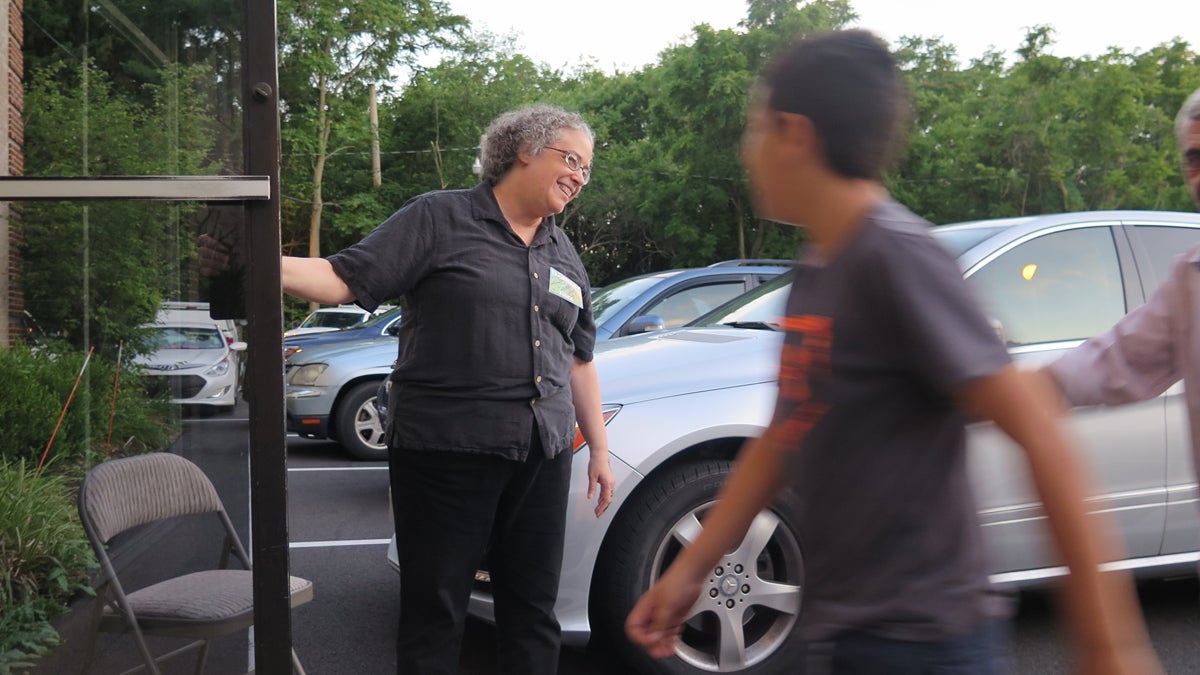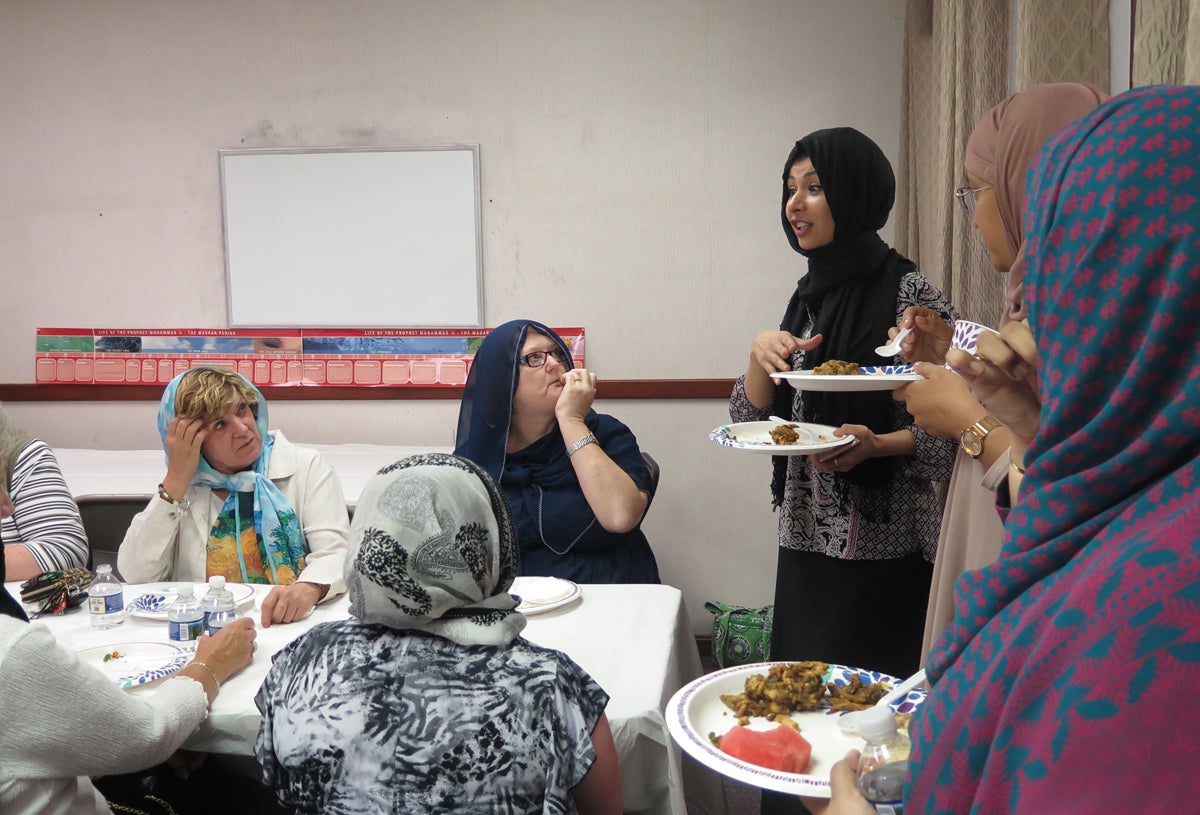How one Islamic community center found tranquility during Ramadan
Listen
Ann Wenger greets worshippers at the Islamic Center of Lancaster during Ramadan. (Emily Previti/WITF)
Some mosques and Islamic community centers throughout Pennsylvania took extra security measures during the holiday of Ramadan. In Lancaster County, a handful of non-Muslims took it upon themselves to keep an eye on things.
When I arrived at the Islamic Center of Lancaster on a balmy Sunday night, I was greeted by a white, middle-aged woman. I was there for iftar, the meal Muslims eat after sundown each night of Ramadan to break the daily fasts required of healthy adults during the month-long Islamic holiday.
On this particular evening, the community iftar included a group from St. Paul’s United Church of Christ in Dallastown whose pastor had invited me to observe the interfaith activity.
Ann Wenger informed me she wasn’t with the church, nor is she Muslim.
“I am with Tranquility Force,” Wenger explained. “We’ve just been hanging out in the parking lot during iftar and prayers during Ramadan. Just to keep watch.”
When I first met, Wenger was alone.
But she said she’s usually joined by one or two of the half dozen people she recruited through Stand Up Lancaster’s Facebook network and her own. They would arrive around 7:45 p.m. Fridays through Sundays, when community iftar would begin, and stay until 10:30 p.m., when the second, longer praying session would get underway.
After the initial prayers and dinner, I spoke with Fariha Sarij, a local doctor, about the presence in the parking lot outside.
She told me Wenger reached out in advance of nationwide demonstrations by the anti-Muslim activist group ACT for America, including one at the state Capitol about half an hour away.“I think because of that march that was happening, they were just kind of afraid and there’s other things going on around the country that we hear about. And of course we appreciate it, just that they [Wenger and others] would show their love,” Sarij said. “But we haven’t had any kind of threats or anything.”
Instead, the center’s received an outpouring of support in the form of emails, phone calls, and interfaith activities with churches and synagogues, according to Dr. Shakeel Amanullah, chairman of center’s Board of Trustees.
“I know there has been rhetoric that has been unpredictable out there. But a lot of conversations would not have happened, had there not be questions in people’s mind,” Amanullah said. “This is a great conversation. I think people are comfortable to ask questions now.”
Still, others say they worry.
Attufat Akbar, an artist who helps her husband run their carryout halal restaurant just outside the city of Lancaster, says she’s anxious about misperceptions of their entire community based on news coverage and political rhetoric surrounding extremist groups.
“Every time there’s a bad thing going on in the community or the world, we get scared, like I hope it’s not a Muslim. Seriously, that’s the biggest fear we have about it,” Akbar said.
That’s part of what Wenger says when she talks about why she’s here: to show support and maybe give people peace of mind while they’re praying together.
As a therapist, Wenger sees the emotional toll of recent public discourse frequently in her clients from all walks of life.
“I don’t have any clients who are Muslim. I have clients who are people of color, in the LGBTQ community, immigrants. So I’ve seen more fear, more trepidation, definitely. A lot resignation, in a way,” Wenger said. “It hasn’t been all that shocking to see the level of visible, expressed hate rising. But it is still deeply disappointing.”
 Attufat Akbar (center right) speaks to a group of women from St. Paul’s United Church of Christ Dallastown during an interfaith community iftar at the Islamic Center of Lancaster. (Emily Previt/WITF)
Attufat Akbar (center right) speaks to a group of women from St. Paul’s United Church of Christ Dallastown during an interfaith community iftar at the Islamic Center of Lancaster. (Emily Previt/WITF)
The Council on American-Islamic Relations, or CAIR, issued a security advisory a couple weeks ago, citing recent violence and threats against Muslims in London, Portland, and Virginia.
But some Muslim communities in Pennsylvania decided months ago to bolster security during Ramadan.
Rizwan Butt is president of the Easton-Phillipsburg Muslim Association.
“We’re always concerned about security, in general, of people coming and going that late at night especially when there’s families and children involved. But over the past couple of years we’ve been extra careful. And this year, specifically, we actually hired a private security company,” Butt said.
The Muslim Association of Lehigh Valley also hired private security and both MALV and EPMA are doing security assessments, Butt said. In Scranton, one mosque hired a police officer for the end of Ramadan.
Hate mail received last year by the Islamic Center of Pittsburgh, where Wasi Mohamed is executive director, prompted a security upgrade that’s still in progress and offers by local non-Muslims to escort people to the grocery store and during other typical daily tasks (when attacks or threats usually occur, Mohamed pointed out).
“We had to be particularly careful this year, but security is a complicated thing at a mosque,” Mohamed said. “We have prayers five times a day. Even between prayers, people come to read or pray or reflect. And the open door policy is meant for anyone, so obviously trying to maintain that and be more secure, is tough. Also, people who would cause us harm are those who we want to come the most to see there’s nothing nefarious going on.”
The dozen or so mosques in the Harrisburg area weren’t taking extra precautions, according to spokeswoman Samia Malik, although the Islamic Society of Greater Harrisburg was supported by a church whose membership kept watch outside (in similar fashion to Wenger) after getting a threatening letter around the same time as the Pittsburgh Center.
Some other organizations similarly chose not to boost security in the typical sense.
“While we are aware of these things, in Berks County, we feel blessed we don’t have to worry,” said Hamid Chaudhry, vice-president of the Islamic Center of Reading. “We had at least a thousand visitors who came and visited our community during Ramadan: teachers, clergy, various churches and other organizations. We feel blessed we have a lot of community support. We’re part of the fabric of the community.”
Interfaith events were widespread, though, with one in Philadelphia drawing more than 400 non-Mulsims, according to the city’s CAIR chapter. And such joint events and coalition building with other religious groups (along with schools, businesses, and local law enforcement) are elements of security guidance provided by CAIR.
CAIR also tracks non-criminal bias incidents against Muslims, as well as hate crimes.
Its 2017 report noted a spike nationally over the last two years, similar to the rise in anti-Islamic hate crimes documented by Uniform Crime Statistics kept by the FBI.
“Even though we live in a relatively safe area and people know — a verbal altercation, a physical altercation, or some type of terrorist attack against the mosque —all those things are possible things that can happen based on the political climate,” Butt said.
In Pennsylvania, there were eight anti-Islamic hate crimes in 2015, the most since 2001, the year of September 11 terrorist attacks. Last year, the number dropped to two, which is in line with the annual average since 2000, according to an analsyis of the statewide Uniformed Crime Statistics.
Every year for the past five, nearly half of religion-based discrimination cases handled by the Pennsylvania Human Relations Commission have involved bias against Muslims, more than any other religious group, according to an analysis of PHRC data.
But Ann Wenger, the woman who greeted me at the community center, says it was an incident in Ohio that moved her to action.
A Muslim woman was hospitalized for injuries sustained during a brawl in an apartment complex. Although, police haven’t arrested anyone and aren’t investigating the incident as a hate crime because they say there are conflicting reports about what happened.
“I just feel like I had to do something,” Wenger said. “So this is a place where I can be. I know that during Ramadan, these people will be here. And I can be here. Not because there’s an expectation that something violent will happen. But if something were to happen, we are here. We are watching, we are witnessing, we are being a force for tranquility.”
WHYY is your source for fact-based, in-depth journalism and information. As a nonprofit organization, we rely on financial support from readers like you. Please give today.



